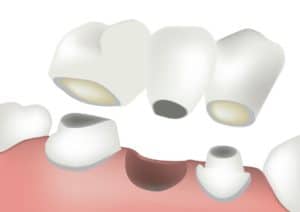 If you have one or more missing teeth, a dental bridge is a great option to make your smile whole again. A dental bridge is a non-removable device that fills in the gap left by a missing tooth. Replacing missing teeth with a dental bridge offers many benefits, including preventing the surrounding teeth from shifting in the mouth, restoring an even bite and enhancing chewing function.
If you have one or more missing teeth, a dental bridge is a great option to make your smile whole again. A dental bridge is a non-removable device that fills in the gap left by a missing tooth. Replacing missing teeth with a dental bridge offers many benefits, including preventing the surrounding teeth from shifting in the mouth, restoring an even bite and enhancing chewing function.
If you are considering a dental bridge, read on as the team at Northfield Dental Group discusses the three main types of dental bridges.
Conventional Fixed Bridge
A conventional fixed bridge consists of a pontic, or artificial tooth, supported on either side by a crown. If you have strong, healthy teeth on either side of the gap, your dentist may suggest a conventional fixed bridge. A small amount of tooth structure may be removed on the supporting (abutment) teeth to accommodate the bridge.
Cantilever Bridge
A cantilever bridge consists of a pontic with two dental crowns positioned next to each other. This type of bridge is typically recommended to replace missing teeth in the front of the mouth, where the least amount of pressure is placed on the abutment teeth. Cantilever bridges may involve removing a bit of tooth structure on the abutment teeth to accommodate the bridge.
Maryland Bridge
A Maryland bridge, or resin-bonded bridge, consists of a pontic attached to two metal wings or clips. The metal wings are bonded to the back of the two teeth surrounding the gap left by a missing tooth. Unlike conventional and cantilever bridges, a Maryland bridge does not require preparing the neighboring abutment teeth extensively. Maryland bridges are usually used on the front teeth. Maryland bridges are not an appropriate option if you have fillings in your abutment teeth.
Good Candidates for Dental Bridges
Dental bridges are supported by surrounding teeth. This means candidates must have healthy, intact teeth on one or both sides of the gap. If the surrounding teeth are severely decayed or structurally unsound, our dentists may need to repair them so they can properly support the artificial tooth. The gums must also be healthy as they support the teeth that hold the bridge.
One of our West Orange dentists can discuss your dental bridge options in detail with you during a personal appointment. Contact us at Northfield Dental Group by calling (973) 736-0111 today.




 Our Practice
Our Practice Our Doctors
Our Doctors Blog
Blog Special Offers
Special Offers Financing
Financing Testimonials
Testimonials